Share
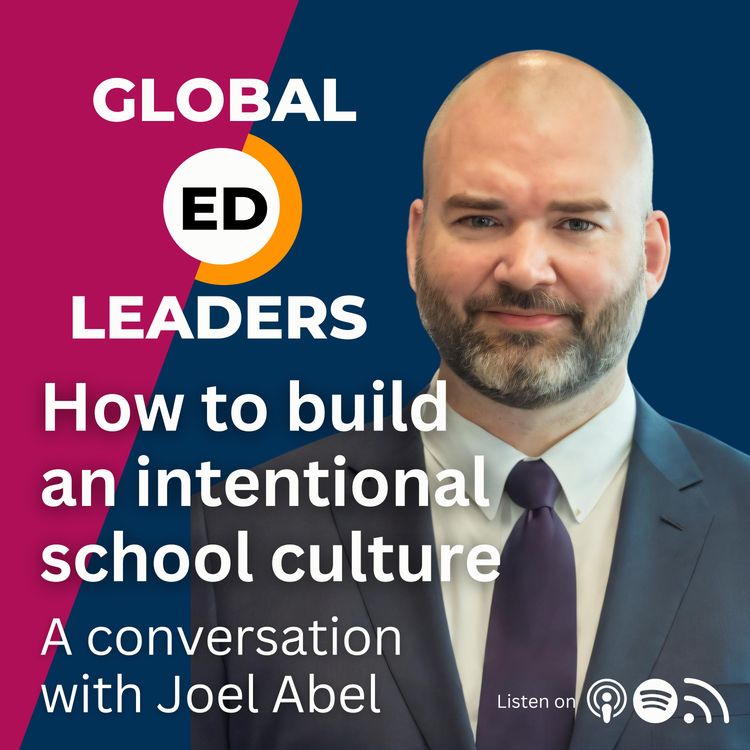
Education Leaders | Strategic School Leadership
How to Build an Intentional School Culture | A Conversation With Joel Abel
In this episode, we dive deep into school culture with Joel Abel, author of Teacher First Management. Joel shares practical insights on how to build and maintain intentional school culture, introducing his culture feedback loop model that connects results, actions, and beliefs. We explore why simply mandating actions isn't enough and how to create experiences that genuinely shift teacher beliefs and behaviors.
Key Topics Covered:
- Why culture happens whether you plan it or not
- The culture feedback loop model
- How beliefs drive actions in school settings
- Leveraging diversity in international schools
- Supporting different teacher motivations
- Moving beyond student-centered to teacher-first management
- Creating sustainable cultural change
Resources Mentioned:
- Teacher First Management - Joel's book
- The Culture Map by Erin Meyer
Episode Partners
The University of Warwick's International Programmes | Learn more at warwick.ac.uk
The International Curriculum Association | Learn more at internationalcurriculum.com.
Thank you for tuning in, and as always, if you found this episode useful, please share your experience. You can find me online on LinkedIn and Bluesky. My website is shaneleaning.com and email address is shane@shaneleaning.com.
About the host
Shane Leaning, an organisational coach based in Shanghai, supports international schools globally. He co-founded Work Collaborative and hosts the chat-topping school leadership podcast, Global Ed Leaders. Previously, he worked as Regional Head of Teaching Development for Nord Anglia Education. Passionate about empowering educators, he is currently co-authoring 'Change Starts Here.' As a CollectivEd Fellow, Teacher Development Trust Associate, and TEDx speaker, Shane has extensive experience in the UK and Asia and is a recognised voice in international education leadership. Learn more at shaneleaning.com.
Join Shane's Intensive Leadership Programme at educationleaders.co/intensive
Shane Leaning, an organisational coach based in Shanghai, supports school leaders globally. Passionate about empowment, he is the author of the best-selling 'Change Starts Here.' Shane is a leading educational voice in the UK, Asia and around the world.
You can find Shane on LinkedIn and Bluesky. or shaneleaning.com
More episodes
View all episodes
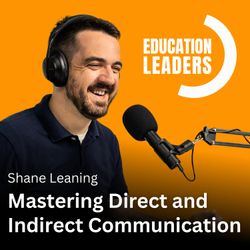
143. Mastering Direct and Indirect Communication
14:08||Ep. 143What if being direct isn't the same as being clear? Shane challenges a core assumption in leadership advice: that directness equals clarity. Drawing on Edward Hall's work on high and low context cultures and a recent conversation with Eunice Okpotu about psychological safety, Shane introduces a quadrant framework that separates directness from clarity. He's seen UK heads who are incredibly direct yet leave staff confused, and Chinese leaders who never directly confront anyone yet maintain crystal-clear standards across their schools. You'll learn the four quadrants of communication (direct and clear, direct and unclear, indirect and unclear, and indirect and clear), when to use each approach, and why indirect clarity is an overlooked leadership tool. Shane explains why indirect communication can preserve face whilst maintaining standards, when directness is essential (performance issues, safety concerns, legal requirements), and how the most effective leaders are fluent in both modes. If you've ever been frustrated by indirect communication or wondered why your direct feedback isn't landing, this framework will change how you think about leadership communication. Resources & Links Mentioned:Edward Hall's work on high and low context cultures Episode PartnersInternational Curriculum AssociationTeaching Walkthrus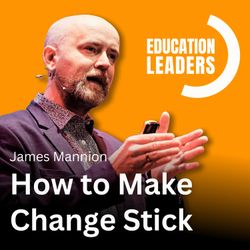
142. How to Make Change Stick | A Conversation with Dr James Mannion
33:12||Ep. 142Dr James Mannion has noticed something telling when working with school leaders: ask them what proportion of change initiatives actually improved anything. Most estimate 10-20%, but when pressed about sustainable change with real evidence, that figure drops to nearly zero. Dr James Mannion, author of a comprehensive programme on implementation science, explains why this failure rate persists despite everyone knowing about it and more importantly, how schools can break the cycle. James reveals two deep-rooted issues: leaders aren't taught change management, and we default to top-down approaches that violate people's fundamental need for autonomy. You'll learn why healthcare takes 17 years to achieve just 14% uptake of proven practices, how to build slice teams that bring genuine representation to decision-making, and the power of five-minute interviews for surfacing concerns without fear of repercussion. Shane and James discuss the difference between implementation science and improvement science, why sceptics make valuable team members, and how to create ground rules that prevent groupthink. If you're tired of watching initiatives fail despite good intentions, this conversation offers a practical roadmap for change that actually sticks. Resources & Links Mentioned:Dr James Mannion's Making Change Stick programmeDr James Mannion's LinkedIn profileDr James Mannion's podcast Episode PartnersInternational Centre for Coaching in Education (Use discount code SHANE5 for 5% off)International Curriculum Association
141. Your Top Picks: Most Listened Episodes
14:53||Ep. 141As 2025 comes to a close, Shane reflects on the year by counting down the five most listened to episodes of Education Leaders. The podcast has grown significantly, doubling in size just in the last six months and reaching around 150 episodes total. Whether you've been following along all year or you're brand new to the show, this episode gives you a curated guide to the conversations that resonated most with school leaders worldwide. You'll hear about episodes covering everything from mastering your interview game to understanding why teachers resist great ideas, from curriculum change implementation to the unique challenges of teacher educators. Shane shares why each episode connected with listeners, what makes them valuable, and which specific insights from Katherine Birbalsingh, Dr Ciara O'Donnell, Christopher Youles, Ben Whitaker and Orla Dempsey stood out. If you're looking for the most impactful conversations from the year or want to catch up on episodes you might have missed, this countdown will guide you to exactly what busy school leaders found most useful. Resources & Links Mentioned:Master Your Leadership Interview Game | A Conversation with Orla DempseyHow To Learn From Everyone | A Conversation with Ben WhitakerWhy Teachers Resist your Great Ideas | A Conversation with Christopher YoulesWhen Teachers Teach Teachers | A Conversation with Dr. Ciara O'DonnellLeading With Conviction | A Conversation with Katharine BirbalsinghEducation Leaders Live bonus episodes with Chris Scorer Episode PartnersInternational Centre for Coaching in Education (Use discount code SHANE5 for 5% off)International Curriculum Association
140. School Character and Culture First | A Conversation with Tamara Yuill Proctor
28:49||Ep. 140When Dr. Tamara Yuill Proctor began researching curriculum integration at secondary level, she quickly discovered that successful change wasn't really about curriculum at all. It was about understanding the character and culture of the school first: the people, their capacity, the school's history, and what the community actually needs. In this conversation, Tam shares findings from her doctoral research into how schools create meaningful change, focusing on a New Zealand school that hadn't changed its timetable in 25 years yet managed to transform its approach to learning. You'll learn why every change initiative Tam has led takes exactly six months for teachers to build the relational trust needed to collaborate effectively, how to balance being adaptable with staying mission-focused, and why "pockets of change" work better than whole-school transformation. Tam explains the critical role of middle leaders as conduits between vision and classroom practice, shares practical advice on giving teachers space to be frustrated during change, and reveals why clear learning outcomes matter more than rigid plans. If you're leading any kind of school change - whether curriculum redesign, new systems, or pedagogical shifts - this episode will help you understand why the human elements matter most. Resources & Links Mentioned:Tam on LinkedInUWC Changshu China Episode PartnersInternational Centre for Coaching in Education (Use discount code SHANE5 for 5% off)International Curriculum Association
139. LIVE | December Reflections
56:08||Ep. 139Welcome to our December edition of Education Leaders LIVE, where Chris Scorer and Shane Leaning reflect on the month's episodes. This time we reviewed three conversations that sparked some genuine debate between us. From firefighting versus long-term thinking, to whether HR should serve leadership or staff (we still don't agree), to the fundamentals of building trust quickly. We also had a surprisingly heated discussion about whether bookshelves should be organised by colour or subject matter. Chris's Christmas wish for all educators? Switch off your computers and actually rest.This monthly live show is meant to be more than just Shane and Chris chatting. It's a conversation with you, our community. Join us on the last Thursday of every month at 6pm Shanghai time (10am UK) on LinkedIn Live, YouTube Live, or at educationleaders.live.Episodes DiscussedHow to Think Long Term When Everything's On Fire https://shaneleaning.com/podcast/137Ethical School Leadership | A Conversation with Dr. Yael Cass https://shaneleaning.com/podcast/138How to Build Leadership Trust https://shaneleaning.com/podcast/139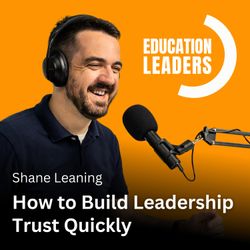
139. How to Build Leadership Trust Quickly
14:19||Ep. 139Which breaks faster: trust in someone's competence or trust in their character? Shane explores Stephen Covey's framework that trust operates on two separate dimensions. Competence trust builds quickly through credentials, positions, and demonstrated capability, but character trust takes time to develop through consistent honesty and integrity. The crucial insight? While competence breaks slowly with each mistake being somewhat forgivable, character trust can shatter in a single moment. Shane shares a vulnerable story from his own leadership journey about a time he broke someone's trust and the lasting impact it had on that professional relationship. You'll learn a practical three-part transparency framework that builds character trust quickly whilst you're still establishing competence. Shane explains how to share your thinking process when uncertain, admit what you don't know whilst committing to find out, and explain your decisions even when they're unpopular. This approach doesn't just build trust faster, it protects you from appearing incompetent, reduces your cognitive load as a leader, and models the honest behaviour you want from your team. If you've ever worried about looking weak by admitting uncertainty, this episode will change how you approach leadership communication. Resources & Links Mentioned: The 7 Habits of Highly Effective People by Stephen CoveyEducation Leaders Intensive - 10-week leadership programme Episode PartnersInternational Centre for Coaching in Education (Use discount code SHANE5 for 5% off)International Curriculum Association
138. Ethical School Leadership | A Conversation with Dr Yael Cass
32:28||Ep. 138Compliance feels safer than ethics. You can tick the boxes, point to the policies, and stay in your head without engaging the emotional discomfort. But what if that's exactly the problem? In this episode, Dr Yael Cass introduces the concept of "compliance plus," a thoughtful, human-centred approach that brings intention and reflection into the systems schools rely on. Yael explains why international schools often have confusing organisational structures that look like "a bowl of spaghetti," why we still call operational professionals "support staff," and how the lack of clear systems triggers what she calls organisational sensemaking, where people start thinking about threats to themselves rather than collective goals. You'll learn why job descriptions in most schools haven't been reviewed in years even though roles have completely evolved, how professional development decisions are often made based on visibility or personal rapport with leadership rather than clear criteria, and why giving HR real strategic authority could reduce the overwhelming administrative load on principals and heads of school. Yael shares practical steps: look for gaps between what's written and what's actually happening, audit one area like recruitment for alignment with your values, and send an anonymous survey asking whether your appraisal system actually supports people or just ticks boxes. This conversation challenges how you think about structure, fairness, and what it means to build a workplace where the people who serve your students can actually flourish. Resources & Links Mentioned:Dr Yael Cass and NexGen Talent GroupDr Yael Cass on LinkedInEpisode PartnersInternational Centre for Coaching in Education (Use discount code SHANE5 for 5% off)International Curriculum Association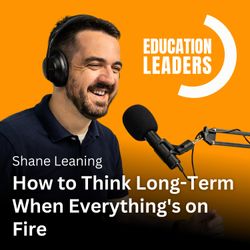
137. How to Think Long-Term When Everything's on Fire
16:54||Ep. 137Your budget's been slashed, three teachers have resigned, parents are complaining about the new timetable, and someone's asking about your five-year strategic plan. Sound familiar? This episode tackles the leadership trap that stops brilliant school leaders from making real progress: abandoning long-term thinking the moment a crisis hits. Shane explores why waiting for things to calm down before thinking strategically means you'll be waiting forever, and why firefighting mode becomes a dangerous default that creates more problems than it solves. You'll learn the three anchors that keep strategic leaders grounded during chaos: identifying your non-negotiables (three to five things that don't change no matter what), asking one weekly question that maintains forward momentum, and conducting a monthly review that prevents short-term decisions from creating long-term disasters. Shane shares research showing that 75% of change initiatives fail not because ideas were poor, but because organisations revert to short-term thinking under pressure. If you're exhausted from constant crisis management but frustrated that nothing's actually changing in your school, this episode will show you how to lead strategically even when everything feels urgent. Resources & Links Mentioned:FCLT Global and Harvard Law School Corporate Governance Forum researchMcKinsey 2017 study on long-term thinkingBoston Consulting Group research on organisational change Episode PartnersInternational Centre for Coaching in Education (Use discount code SHANE5 for 5% off)International Curriculum Association
136. LIVE | November Reflections
43:57||Ep. 136This month's Education Leaders LIVE brings together the big themes from November's episodes. Chris and Shane dig into what trust actually looks like in schools, why the shift from scrutiny to development matters so much, and whether leaders at trust level can genuinely connect with classroom teachers. The conversation around Sam Gibbs' episode sparks a proper debate about loss aversion and what happens when teachers stop putting themselves out there because they're tired of being judged. There's also honest reflection on Jo Robinson's coaching insights and what it means to be proactive rather than reactive as a leader.The discussion gets particularly real when they tackle the "have you got a moment" problem. Is it selfish to protect your focus time? How do you balance being available with actually getting strategic work done? Chris and Shane explore the tension between open-door policies and the reality that leaders need thinking space too. Plus, they revisit Maureen and James' work on student leadership and why we shouldn't treat leadership as something kids either have or don't.Episodes discussed:Teaching Leadership Through Curriculum with James Simons and Maureen ChapmanHave You Got A Moment?Coaching For School Leaders with Jo RobinsonHow to Trust Your Teachers with Sam Gibbs